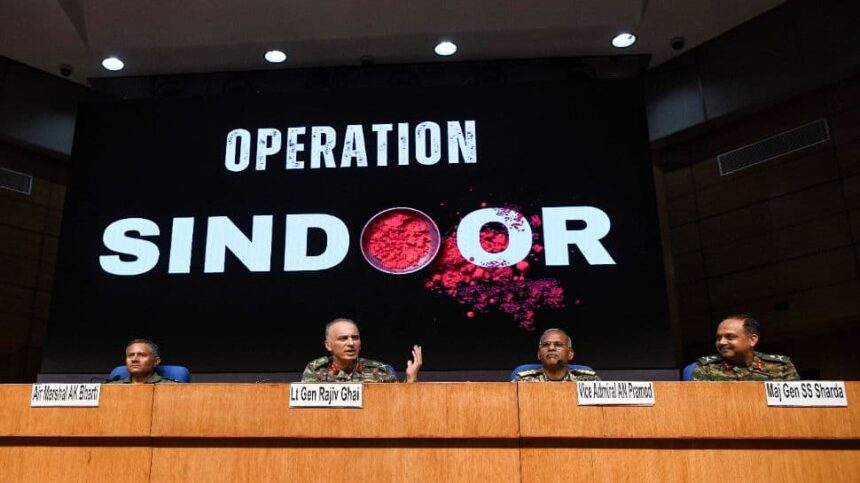New Delhi: Operation Sindoor Sets New Standard in India’s Defense Strategy
India’s military operation, Operation Sindoor, has marked a significant milestone in its defense strategy. Through a combination of precise strikes and strategic non-military actions, India not only punished Pakistan for its involvement in the deadly Pahalgam attack but also sent a clear message to its neighbor: terrorism will no longer be tolerated.
The operation, which targeted key terror hubs and crippled Pakistan’s air defenses, reshaped the rules of engagement, imposed deep economic and diplomatic costs, and made it clear that India will take decisive action to protect its people, regardless of the cost.
Military Actions
The military campaign began with India’s coordinated and deliberate missile strikes targeting nine key terrorist facilities across Pakistan and Pakistan-occupied Kashmir. Four of these facilities were located within Pakistan, including significant sites in Bahawalpur and Muridke, while the remaining five targets were in Pakistan-occupied Kashmir, such as Muzaffarabad and Kotli.
These sites were known operational bases for the Jaish-e-Mohammed (JeM) and the Lashkar-e-Toiba (LeT), groups responsible for major attacks on India, such as Pulwama (2019) and Mumbai (2008). India’s missile strikes were precise and devastating for the enemy.
Responding to Pakistan’s retaliatory missile and drone strikes on May 7, 8, and 9 that targeted its cities and military installations, India launched a kamikaze drone offensive. The move successfully destroyed Pakistani air defenses across the country, including the neutralization of the air defense system in Lahore.
India’s air defense systems also played a crucial role in intercepting all incoming threats, resulting in near-zero casualties and material damage for the country, while simultaneously exposing the flaws in Pakistan’s HQ-9 air defense system – an important component of its Chinese-supplied defense infrastructure.
One of the most significant aspects of the military campaign was India’s counter-air force actions on the night of May 9 and 10. This operation marked the first instance of a country damaging the air force camps of a nuclear-armed adversary. India successfully targeted and destroyed 11 Pakistani air bases, including those at Nur Khan, Rafiqui, Murid, Sukkur, Sialkot, Pasrur, Chunian, Sargodha, Skardu, Bholari, and Jacobabad.
The scale of destruction was so significant that before-and-after satellite imagery from Shahbaz Airbase at Jacobabad vividly captured the devastating impact of the strikes. The destruction extended to ammunition depots and fighter jets stationed at bases such as Sagodha and Bholari, leading to the loss of 20% of Pakistan’s air force infrastructure.
The bombing of Bholari air base killed over 50 personnel, including Squadron Leader Usman Yousuf and four airmen, while also destroying several Pakistani fighter jets.
Apart from these strikes, India also responded to Pakistan’s artillery and mortar shelling along the Line of Control (LoC) in the Poonch-Rajouri sector, which had targeted civilian areas. Indian troops retaliated with calibrated counterfire and destroyed terrorist bunkers and Pakistani military positions that had been used to launch attacks on civilians.
Symbolizing the destruction of Pakistan’s military and political image, a half-burnt portrait of Asif Ali Zardari was found amid the smouldering debris of the Rahimyar Khan air base. It highlighted the scale of the operation’s success.
Non-Military Measures
While the military action was critical, India’s non-military measures were equally impactful in shaping the strategic environment. India implemented a series of non-kinetic actions aimed at isolating Pakistan diplomatically, imposing significant economic costs, and reinforcing its position on terrorism.
A decisive move was the suspension of the Indus Waters Treaty, a step that sent a strong message to Pakistan. The Indus River system is essential for Pakistan’s water supply, supporting 80% of its 16 million hectares of farmland and 93% of its total water use.
With this suspension, India effectively held control over crucial western rivers like the Jhelum and Chenab and allowed it to develop new infrastructure in Jammu and Kashmir while denying Pakistan access to the river waters it relies on for agriculture and industry. This move could lead to catastrophic agricultural losses, water shortages, and power blackouts in Pakistan, crippling its already fragile economy.
India also took swift and direct actions to hit hard Pakistan’s economy. It closed the Attari-Wagah border and halted all bilateral trade, including exports of onions and imports of cement and textiles. The move severed an important trade route and immediately impacted Pakistan’s economy, already grappling with inflation and debt.
India paralleled the revocation of the visas of all Pakistani nationals living in India, deported them, and imposed a complete ban on Pakistani artists, preventing them from performing or collaborating in India. This ban extended to streaming platforms, effectively cutting off Pakistan’s cultural influence in India.
These actions not only economically weakened Pakistan but also diplomatically isolated it in the global arena.
India’s psychological warfare also played a role in exposing Pakistan’s terror ecosystem to the international community and rallying global support for its anti-terrorism stance. The comprehensive approach, combining both military and non-military measures, demonstrated India’s zero-tolerance policy towards terrorism and reiterated its commitment to national security.
By isolating Pakistan economically and diplomatically, India successfully imposed costs on Pakistan without escalating to full-scale war. It showcased the effectiveness of strategic restraint.
Operation Sindoor has firmly established a new paradigm in India’s approach to counterterrorism, illustrating that terrorism will no longer be tolerated and the consequences will be swift and decisive. By blending military precision with strategic non-kinetic actions, India has proven that it will no longer hesitate to defend its people, punish terror, and assert its sovereignty anytime and anywhere.








